'Fungus-resistant' vines, or PIWIs for short
PIWI vines take the limelight at Hof Gandberg. The white grape varieties Solaris, Bronner, Sovignier gris and Muscaris are cultivated over an area of 2 hectares, with Cabernet Cantor and Cabernet Cortis being the main reds. Another approximately dozen varieties are expression of the Niedermayr family's love of experimentation and constant striving for development.
Why PIWIs?
Thomas explains: “After the mid-19th century, European wine cultivation entered a huge crisis: fungal diseases were spreading all over vineyards at an amazing rate. The increasing development of chemical plant protection meant that vines and their yields could be saved. But why did a number of wild vines – mainly in America and Asia – survive this catastrophe entirely without chemical intervention? They had built up resistance over millions of years. Thanks to natural cross-breeding, a few pioneers in the field of wine growing managed to introduce this resistance to susceptible cultivated vines.“ This is the scientific explanation that Thomas offers in answer to the question.
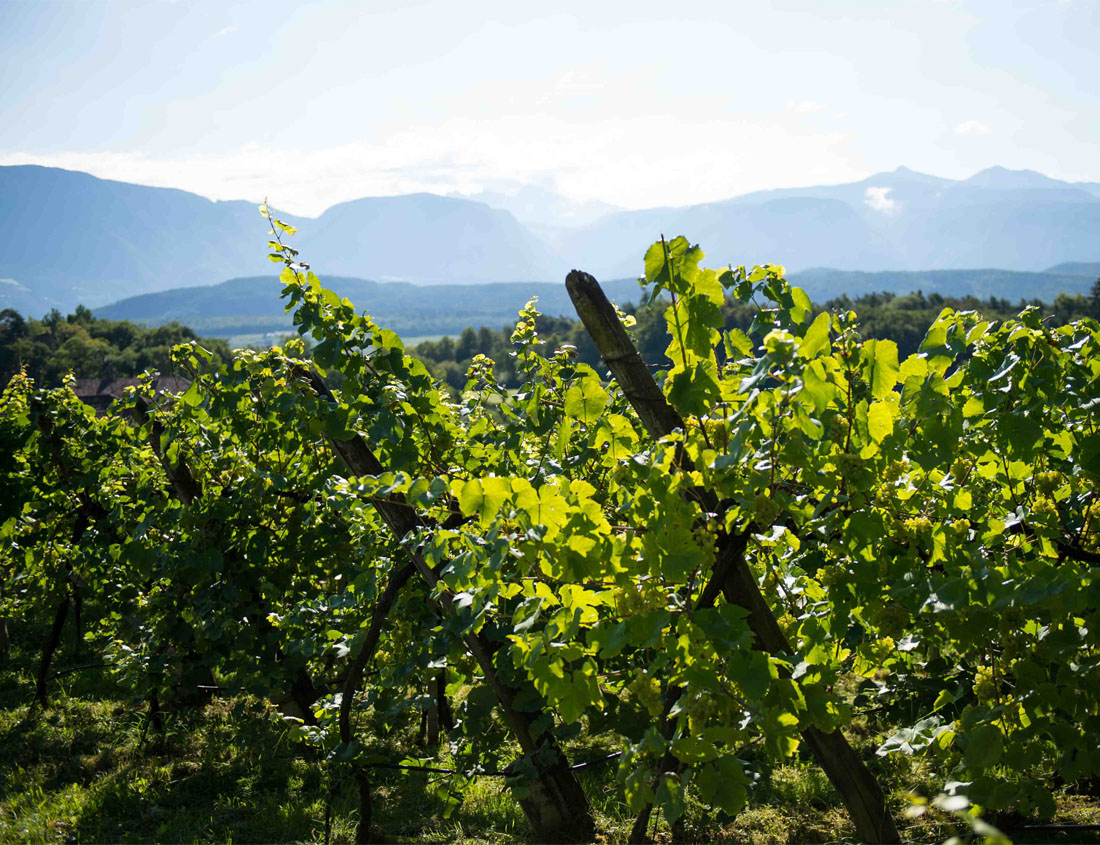
But there is also an emotional one: Thomas is simply proud of what nature can do all by itself, of what the PIWIs (short of German pilzwiderstandsfähig: fungus-resistant) can achieve when there's been a heavy downpour of rain and lots of moisture hangs in the air, creating the ideal conditions for fungus. Thomas observes how his vines get rid of the rampant fungi without any human help.
“It's not that fungi don't thrive on PIWIs, but that they don't stand much of a chance: the vines withdraw all their nutrients at the spots where the fungi start to spread and isolate the point of attack. The result: the fungi are starved of nutrients. The leaves display their battle scars as tiny brown round spots. Yet the victory belongs to the vines – and Thomas and his wines.“
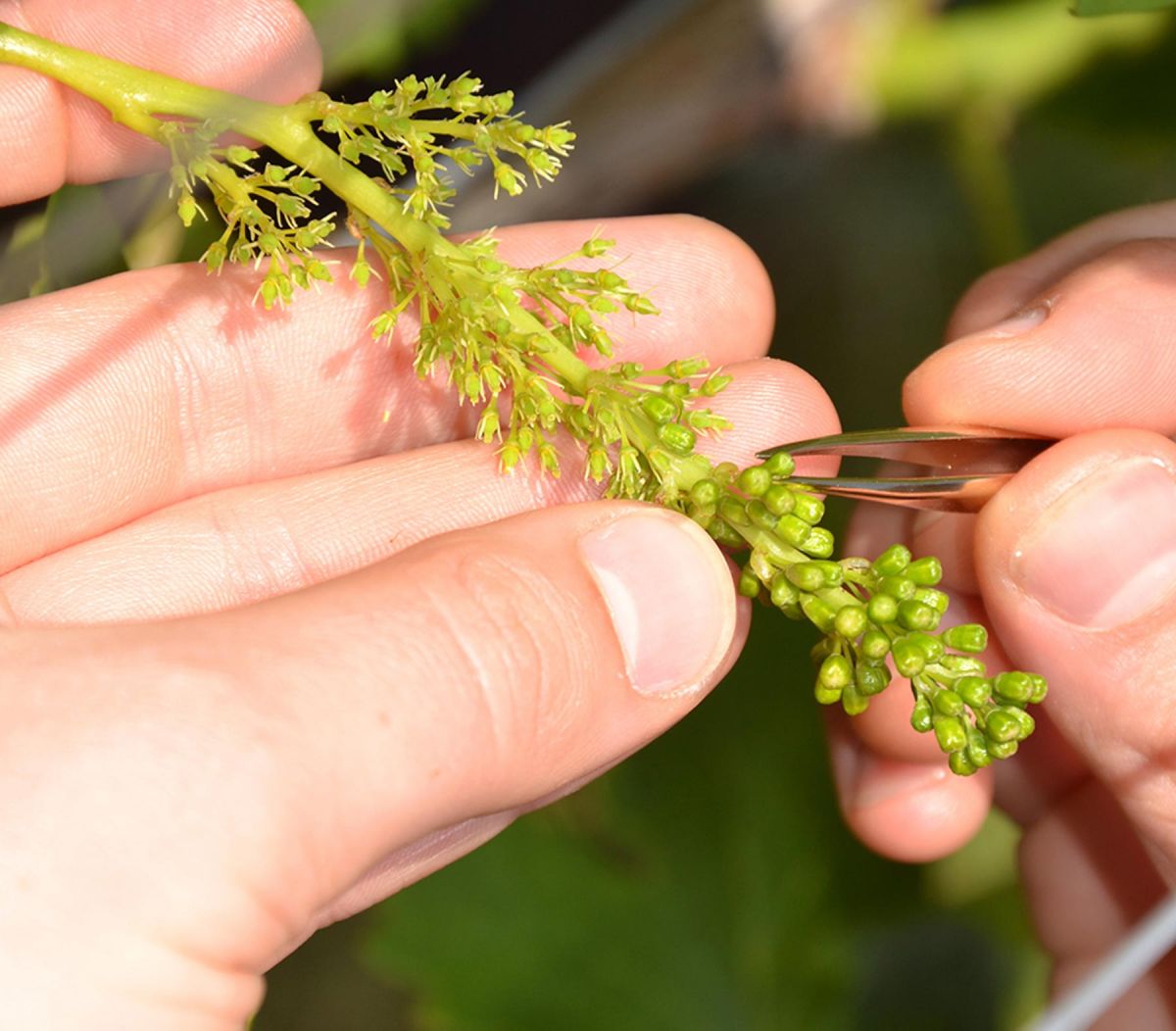
In-house cultivation – how does that work?
Thomas' father Rudolf has been dedicating his time and energy to PIWI cultivation since 2005. Even before the blossom unfolds on the vines, their filaments have to be removed with tweezers and plenty of patience. This is because vines are mostly self-pollinating. As soon as their ovaries are ripe, they are dusted with the pollen of the 'father' vine. During the harvest the blossom is enclosed in bags for its protection. This produces grapes with seeds possessing completely individual inheritance.
Patience produces ... PIWIs
After this, it's time to sow each grape seed, let it grow, and tend it. It soon becomes clear whether it features the desired resistance to fungus, yet evaluating the grape quality, the harvest yield and suitability to be made into wine takes time and patience. It takes at least five to six years to find out whether perfect results have been achieved. In any case, there's a lot of excitement, for a new variety is born!
The highest accolade...
“Awards are an acknowledgement of my work and serve as a reference for wine lovers and customers.“ But Thomas Niedermayr is careful of placing too much value on them. In Thomas' eyes there is something that is much more important: the wine should be recognised as a whole and there is no adequate set of criteria for that. But when you open a bottle and drink, enjoy and experience its contents at your own pace, you get to know its deeper secrets. It is a patient process of approaching, smelling and tasting: a process of getting acquainted with it. As far as Thomas is concerned, the enthusiastic or amazed facial expression of a wine connoisseur when tasting his wine carries more weight than an award. For wine has to be able to do one thing above all else: it has to surprise, taste good and give pleasure.
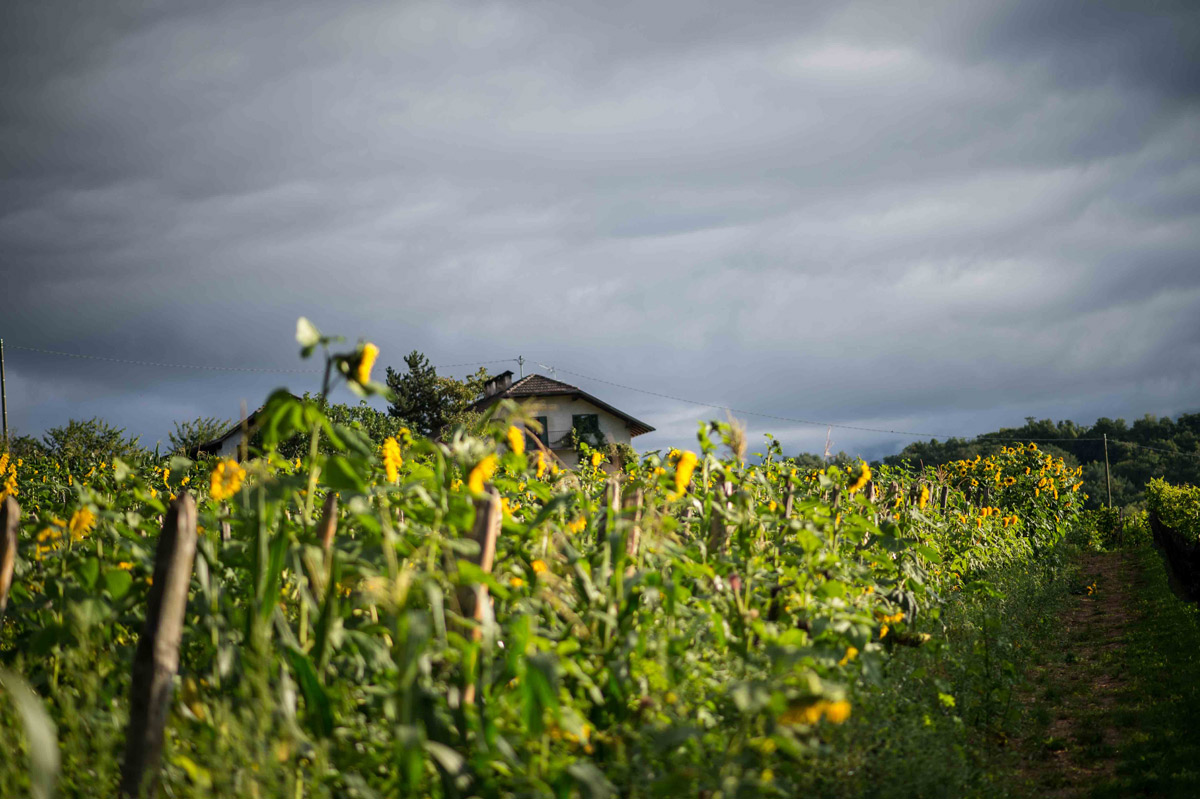
Wine, naturally! An extraordinary organic tour
Lara Sinner: I made my way to Thomas Niedermayr's Hof Gandberg for a tour of the place. I'll report on my reception there, what I learnt and everything behind the concept of 'natural wine' in the following lines.
And there I was, at Hof Gandberg. Thomas Niedermayr was to show me his Bioland vineyards and explain the background to them. I knew that his concept was a special one. But, why? No one reacted to the ringing of the doorbell. Except the cockerel, which let out a loud 'cockadoodledoo' nearby and announced my arrival to all of his feathered friends and the rabbits. I started to make my own way – the owner of the house would soon start work in his vineyard anyway. Then I heard a “hello!“. and there was Thomas, as expected, working beneath the vines with his sister. “Marlene has been working with me for a year. I'm really glad of her help, as there's lots of work to be done in the vineyards if you want to use completely natural methods“.
Biodiversity instead of fertilizer
So there we were, in the midst of the vines, and the tour had begun. It was winter, but I was still able to find out lots about biodiversity. “I sow the seeds every year, which means that a wide variety of different plants can thrive: for example, lucerne, sweet clover, mallow, pulses, bee food, sunflowers; the latter sometimes grow up as high as the vines themselves“, he explained. This biodiversity is good for the vineyards. It means that nutrients may be more easily absorbed from the soil and made more available to the vines. Fertilizer becomes unnecessary, as a natural cycle is created. Thomas can produce his wines in the most natural form possible: simple natural wines (LINK to Wines).“It's all about letting a plant grow naturally. What it needs can be obtained from the soil and there's little call for anything else. With such natural cultivation methods you really have to take care of the plants. But it's always worth it. For when you taste the wine after it has matured in steel and wooden casks, you take even more pleasure in it. You taste wine in its purest form!“
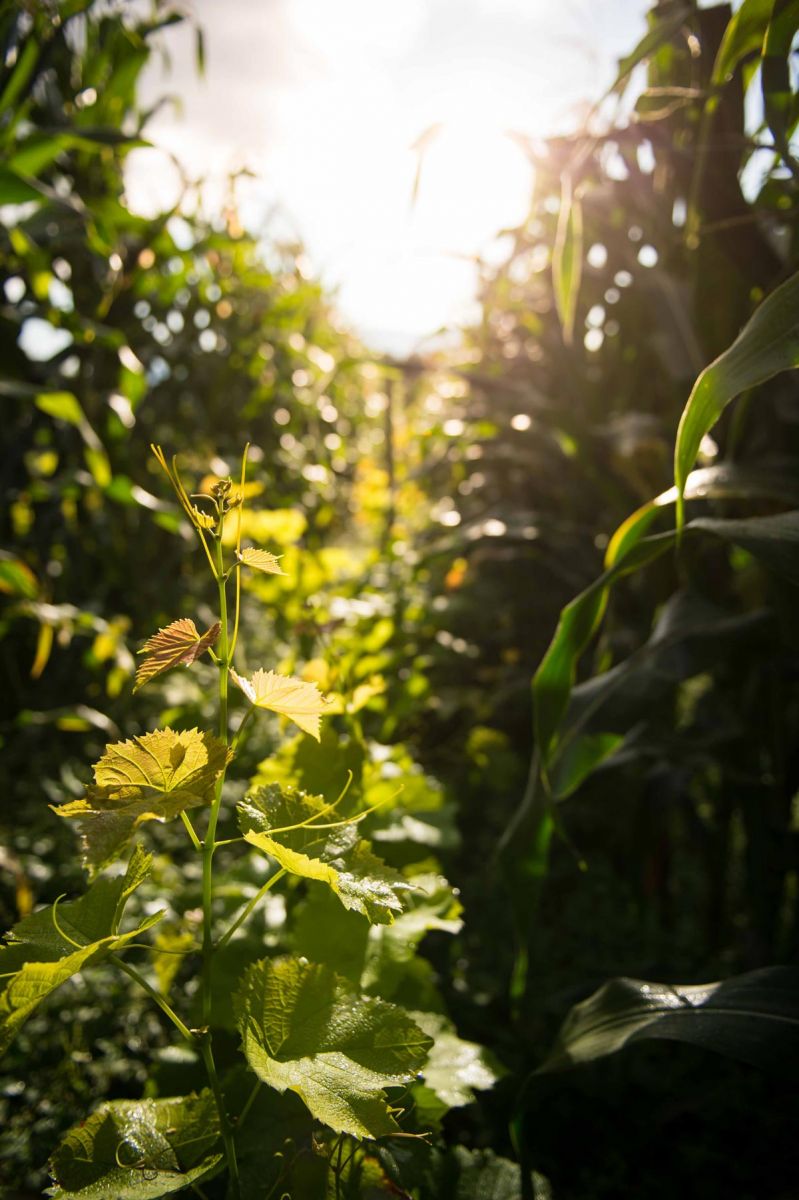
Well begun is half done
Thomas Niedermayr doesn't tend just any old Pinot noir – he grows the rather special Souvignier gris and Bronner varieties. Never heard of them? I hadn't either, until then.
These varieties are fungus-resistant. PIWI vines, as they are known. The special thing is that fungus cannot spread on these vines – it can attack, but is prevented from spreading thanks to the vines' resistance.
Thomas sprays his grapes only in extreme cases, three times a year at the most. He doesn't use chemical pesticides for this, but naturally occurring sulphur. Otherwise, Mother Nature takes care of his vineyards. She knows what the grapes need best of all, he says.
Do It Yourself Polenta und Brot
Thomas geht das Herz auf, wenn er durch seine Weingüter wandert – hier ist es so vielfältig und natürlich wie im Wald. Deshalb isst er auch die Pflanzen, die im Weinberg und am Hof wachsen, er hat sie schließlich selbst gesät. Die Familie versucht sich so weit wie möglich selbst zu versorgen. Davon zeugt ein großer Gemüsegarten. Und seit kurzer Zeit wächst – wie zu Urgroßmutters Zeiten – zwischen den Rebzeilen auch der Roggen. Damit wird dann einmal in der Woche Brot gebacken. Neben Roggen gedeiht hier aber auch Mais ganz hervorragend. Daraus wird dann Polenta gemacht.
Zucchini, Tomaten, Melanzane – hier fehlt es an nichts. Legen die Hühner fleißig Eier, ist die Mahlzeit komplett. Und wenn es von alledem genug gibt, dann werden Gemüse und Eier auch verkauft. Ansonsten gibt es ganz einfach eine Hühnerbrust. Oder einen Hasenbraten. So ist der Kreis des Lebens und so war er schon immer. Wenn schon Fleisch essen, dann doch lieber glückliche Hühner und Hasen. "Wenn sie vorher nicht der Raubvogel geholt hat, wie es manchmal auch passiert," beschwert sich Thomas. Auch das gehört dazu.
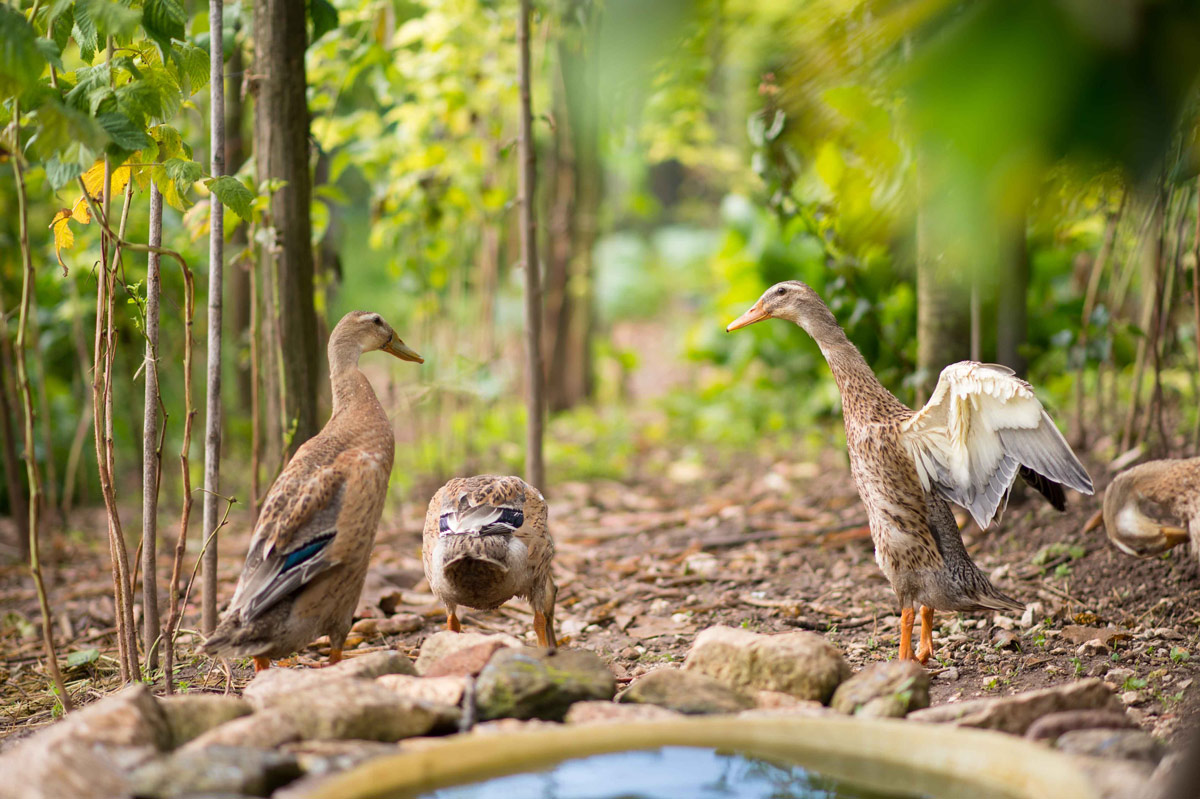
Bionier
Einen klassischen Weissburgunder hegt und pflegt Thomas aber dennoch. Der Nostalgie wegen, sagt er. Den Anfang des Bio-Anbaus hat Thomas’ Vater gemacht, in den 80er-Jahren. Er war eines der ersten Mitglieder beim Bioland-Verband und einer der Vorreiter in der Nutzung von PIWI-Reben. Als überzeugter Weinbauer kann Rudolf nicht die Finger von den Trauben lassen – er hilft Thomas überall und sein größtes Hobby ist es, selbst pilzresistente Weinpflanzen zu züchten. Da steckt viel Geduld dahinter, es ist Pinzetten-Arbeit, die oft nicht einmal Früchte trägt – aber das kann man vorher nie einschätzen.
Wenn dann doch eine selbst gezüchtete Rebe heranwächst und die Beeren auch noch lecker schmecken, dann ist das Grund zu großer Freude! Von seinem Vater hat Thomas auch die Leidenschaft. Er ist damit aufgewachsen und hat den Gedanken des naturnahen Anbaus noch weiter entwickelt. Aber wenn man auf solch besondere Art und Weise Wein herstellt, dann ist auch nicht alles Glanz und Gloria. Dann ist es die Hauptsache, dass man Freude an der Arbeit hat.
So verkraftet man auch ein schwierigeres Jahr. Und es ist umso schöner, wenn der gute Tropfen nach langer und harter Arbeit, in der schönen 7 / 10-Flasche abgefüllt und etikettiert ist. Eine persönliche Note hat Thomas´ Wein vom Hof Gandberg allemal. Denn er lässt Kultur, die es schon seit Jahrhunderten gibt, in neuem Gewand erstrahlen. Das ist nicht nur an der innovativen und mutigen Anbauweise erkennbar – sondern auch im Geschmack des Weines.







